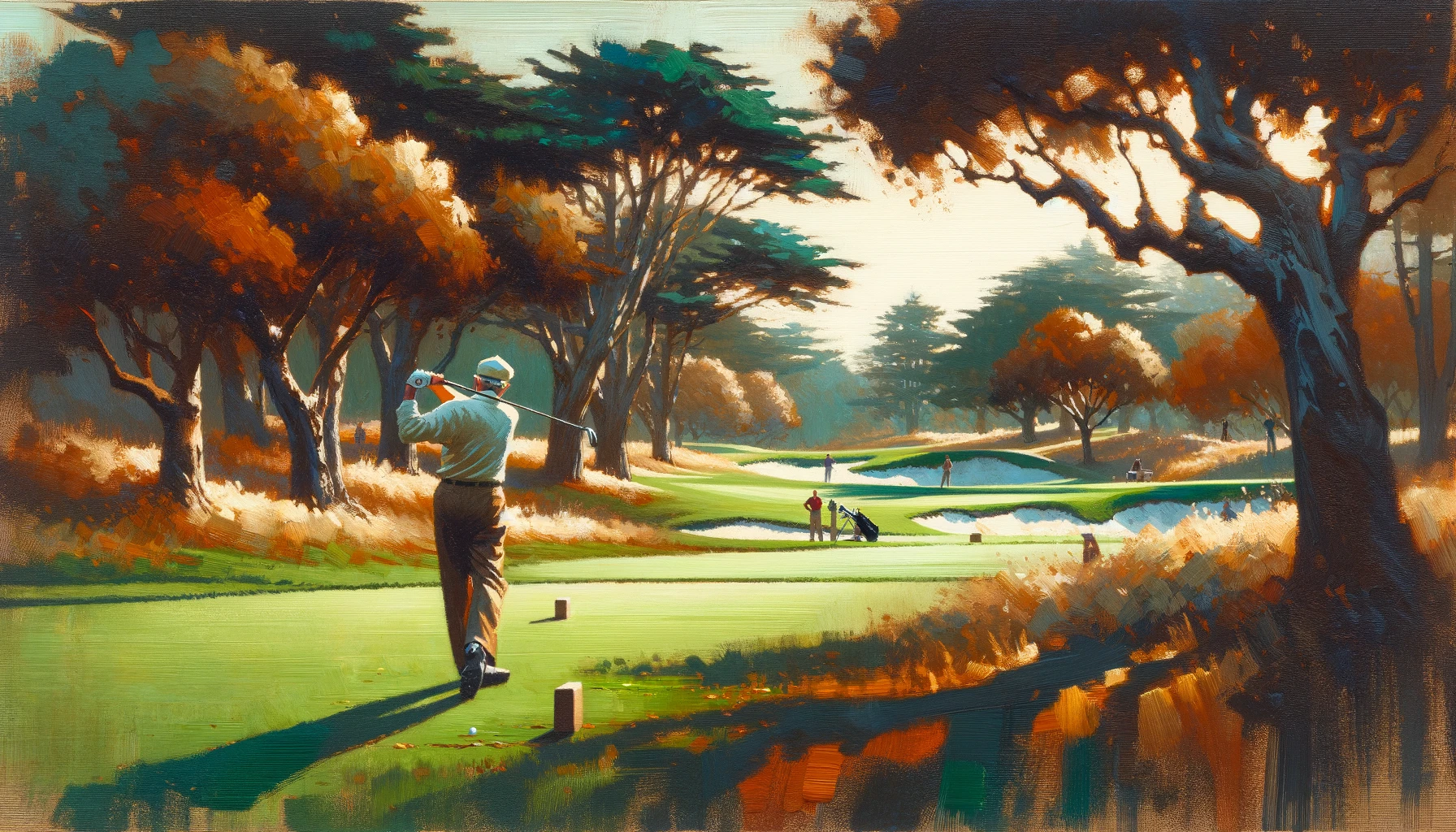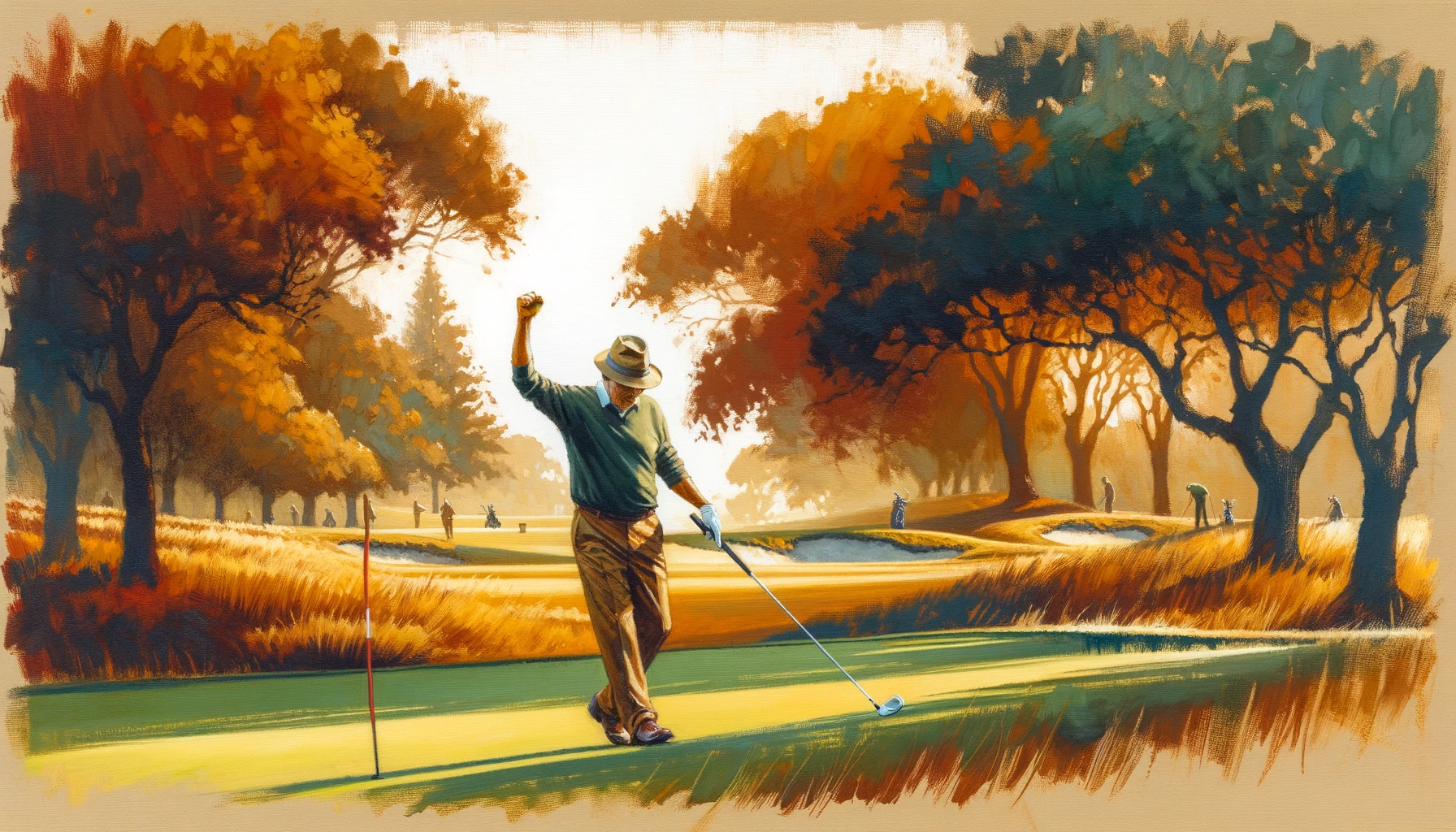- Home
- Guide
- Fundamentals
- Why Do You Think People Enjoy Playing Golf
Exploring the Appeal: Why Do You Think People Enjoy Playing Golf?
Why do people enjoy playing golf? It's not just about the swing or the score; it's about the journey, the connection with nature, and the camaraderie among players. This article dives into the heart of golf's allure, exploring the challenges, beauty, and social bonds that make it a beloved sport across generations. Whether you're a seasoned golfer or new to the course, discover key insights and tips to enhance your game. Don't miss our FAQ section for quick takeaways if you're short on time.
Golf, a game with ancient roots, has captivated millions worldwide, yet many onlookers scratch their heads, wondering, why do people enjoy playing golf so much? The allure of the green fairways, the silent tension before a crucial putt, and the camaraderie among players seem enchanting yet elusive to outsiders. The problem, it seems, is not in the game's mechanics but in understanding the multifaceted joys it brings to its enthusiasts.
The appeal of golf goes beyond the mere act of hitting a ball into a hole. It's an emotional rollercoaster, a test of patience, skill, and sometimes, sheer willpower. From the frustrating slices that veer off into the unknown to the pure bliss of a perfectly executed swing, golf is a game that constantly challenges and rewards. But what really hooks people, from weekend warriors to seasoned pros? Is it the chase for the ever-elusive perfect round, the peace and tranquility of being one with nature, or the thrill of competition that spans generations?
"Exploring the Appeal: Why Do You Think People Enjoy Playing Golf?" delves deep into these questions, exploring the psychological, social, and physical reasons that make golf not just a sport but a passion for so many. From the serenity of early morning tee-offs to the strategic intricacies of course management and the undeniable bond formed among players, this article aims to shed light on the game's unique charm. Whether you're a curious onlooker, a beginner with high hopes, or a seasoned player with a love for the game, join me as we explore the reasons behind golf's global appeal, making it a beloved pastime for people of all ages and backgrounds.
 A serene moment on the golf course, capturing the essence of the game.
A serene moment on the golf course, capturing the essence of the game.What Makes Golf So Addictive to Players of All Ages?
I remember the first time I hit the course; it was a blend of sheer excitement and nerve-wracking anxiety. There’s something about golf that hooks you right from the start. Maybe it's the challenge, the beauty of the courses, or the camaraderie among players. For me, it was all of these and more. Golf is not just a sport; it's a journey—a quest for personal improvement that never seems to end. And here's why it's so addictive to players of all ages.
The Challenge
Golf is a game of skill, strategy, and sometimes, luck. Every course brings its own set of challenges, from wind factors to the layout's complexity. The pursuit of mastering this game, of shaving off just one more stroke, keeps players coming back. It’s a mental and physical puzzle that demands creativity, precision, and adaptation.
The Beauty
Let’s not overlook the venues themselves. Golf courses are often set in stunning locations, offering an escape into nature. The lush fairways, pristine greens, and scenic vistas provide a backdrop that can make any bad round feel insignificant. This connection with nature, combined with the game's serene pace, offers a form of meditation that's hard to find elsewhere.
The Camaraderie
Golf is as much about friendships and connections as it is about hitting a ball. It's a social sport, allowing for conversations and bonding. Whether it’s with family, friends, or new acquaintances met on the course, golf fosters a unique community spirit. Competitive yet respectful, the social aspect of golf adds a rich layer to its appeal.
Personal Growth
Golf is a reflection of life’s ups and downs. It teaches patience, discipline, and humility. The joy of a well-struck drive is often followed by the frustration of a missed putt. Yet, it’s in these moments that golf teaches its most valuable lessons. Overcoming challenges on the course can translate into personal and professional growth off the course.
Accessibility
One of the most beautiful aspects of golf is its accessibility. It’s a sport that can be enjoyed at any age, making it a lifelong pursuit. Whether you’re 8 or 80, the game welcomes you with open arms. The adaptability of golf to different skill levels and physical abilities makes it uniquely inclusive.
Reflecting on my golfing journey, I recall a particular round that encapsulates the essence of golf's allure. It was a day where everything clicked—the drives were long and straight, the putts fell with ease, and the company was exceptional. But more than the score, it was the feeling of being alive, challenged, and connected that stayed with me.
So, why do people enjoy playing golf? It's the challenge, the beauty, the camaraderie, and the endless pursuit of improvement that make golf not just a game, but a way of life. It’s a sport that offers something for everyone, making it addictive to players of all ages.
How Does Golf Foster Social Connections Among Players?
There's an old saying among golfers, "You don't just play golf to hit a ball; you play for the moments shared along the way." This couldn't be more accurate. Golf has this unique way of bringing people together, creating lasting friendships and memories. Here's a closer look at how golf fosters social connections among players of all levels.
A Shared Passion
Golfers are united by a common passion for the game. This shared interest lays the foundation for deep connections. On the course, you're likely to meet individuals from various backgrounds, yet the love for golf creates an instant bond. It’s this camaraderie that transforms a solitary sport into a communal experience.
The 19th Hole
The social aspect of golf extends beyond the fairways and greens. The 19th hole, or the clubhouse, is where stories are shared, laughs are had, and friendships are cemented. It's a space where the competition of the game transitions into social interaction and relaxation.
Golf Events and Tournaments
Golf events and tournaments offer another layer of social interaction. Participating in local leagues or charity events introduces you to a wider community of golfers. These events are not just about the competition; they're about bringing people together for a cause, creating a sense of community and belonging.
Golf Trips and Travel
Golf is also a great excuse to travel and explore new destinations. Planning a golf trip with friends or family can strengthen relationships and create unforgettable experiences. Whether it’s navigating the challenges of a new course together or enjoying the local cuisine after a day on the links, these trips are as much about bonding as they are about golf.
Learning and Improvement
Golf is a journey of continuous learning and improvement, and often, this journey is shared. From taking lessons together to sharing tips and tricks, there’s a sense of mutual support and encouragement among golfers. This shared pursuit of improvement further strengthens the bonds between players.
I recall a time when I was paired with a stranger for a round of golf. By the end of the day, we had shared stories, experiences, and laughter, feeling more like old friends than acquaintances who had just met. It was a reminder of how golf can connect people in meaningful ways.
In essence, golf fosters social connections through shared experiences, mutual support, and the joy of the game. It’s these connections that enrich the golfing experience, making it more than just a sport but a community where everyone is welcome.
 Planning the next move: the strategic side of golf.
Planning the next move: the strategic side of golf.Why Is Golf Considered a Great Way to Improve Mental Health?
Golf is often celebrated for its physical benefits, but its impact on mental health is equally profound. As someone who has found solace and strength on the golf course, I can attest to the therapeutic qualities of the game. Here's how golf serves as a sanctuary for mental well-being.
A Mental Escape
Golf offers an escape from the daily grind. The focus required for each shot creates a singular concentration, pushing aside life's stresses. It's this moment of clarity, amidst the vast greens and under the open sky, that provides a mental respite, allowing for a reset of one’s mental state.
Nature's Therapy
The connection with nature is an intrinsic part of golf's appeal. Walking the course, surrounded by natural beauty, can have a meditative effect. Research has shown that exposure to green spaces reduces stress, enhances mood, and improves overall mental health. Golf courses, with their manicured landscapes and tranquil settings, amplify these benefits.
Physical Exercise and Mental Health
While golf may seem like a leisurely sport, it requires significant physical activity, especially when walking the course. Physical exercise is a proven mood booster, releasing endorphins that decrease feelings of depression, anxiety, and stress. The gentle yet consistent activity of a golf round promotes physical health, which in turn supports mental well-being.
Social Interaction
As previously discussed, golf fosters social connections, which are crucial for mental health. These interactions provide support, combat loneliness, and can significantly contribute to a sense of community and belonging. The positive social experiences found on the golf course can be especially beneficial for those struggling with mental health issues.
Achievements and Self-Esteem
Golf is a game of personal achievement, where progress and success are directly tied to one's effort and skill. The sense of accomplishment from improving your game, hitting a great shot, or reaching a personal best can boost self-esteem and confidence. These positive feelings can extend beyond the course, impacting overall mental health.
Reflecting on my own journey, golf has been a steadfast friend during challenging times. It was on the golf course where I learned to manage frustration, celebrate small victories, and appreciate the moment. These lessons have been invaluable, not just in golf, but in life.
Golf, with its unique combination of physical activity, social interaction, and connection with nature, offers a multifaceted approach to improving mental health. It’s a sport that challenges the body and mind, providing a fulfilling and therapeutic experience that can enhance one's mental and emotional well-being.
 Joy on the golf course: celebrating a successful shot.
Joy on the golf course: celebrating a successful shot.Key Takeaway: Unlocking the Allure of Golf
Golf is more than just a game; it's a journey that offers:
- Personal Challenge and Growth: Every round presents a new challenge, encouraging continuous improvement and personal growth.
- Connection with Nature: Golf courses provide a beautiful setting to enjoy the outdoors, offering a serene escape from daily life.
- Social Bonds: The sport fosters a unique camaraderie among players, making it an excellent way to build and strengthen relationships.
- Mental Health Benefits: Golf is a great way to reduce stress, improve mood, and support overall mental well-being.
Take Action and Join the Golfeaser Community
If you've ever wondered why people enjoy playing golf, now's the perfect time to discover it for yourself. Here's how you can get started and become part of the growing Golfeaser community:
- Give Golf a Try: Visit a local driving range or take a beginner's lesson. Experience firsthand the joys and challenges of the game.
- Share Your Stories: We love hearing from our community members. Share your golfing stories, achievements, and lessons learned with us.
- Sign Up for Our Newsletter: Stay up-to-date with the latest tips, stories, and insights from the Golfeaser community. Our newsletter is packed with valuable content to help you improve your game and enjoy golf even more.
- Live by the Golfeaser Manifesto: Embrace the spirit of the weekend golfer. Whether you're breaking 100 or striving for par, remember that every round is a step towards personal growth and enjoyment.
Golf is a game that continues to give back, providing endless opportunities for enjoyment, improvement, and connection. Why not grab a club and see where your golf journey takes you?
Are you ready to experience the allure of golf and make your mark on the course? Join us, and let's make every round unforgettable. After all, you're just one swing away from falling in love with golf.
Onward...
Why do you think people enjoy playing golf? Is it the challenge, the beauty, the camaraderie, or something else entirely? Whatever your reason, we're here to celebrate it with you. Let's tee off to a journey filled with discovery, improvement, and lots of golfing fun.
FAQ: Why Do People Enjoy Playing Golf?
What makes golf so addictive?
What makes golf so addictive?
Golf challenges players both physically and mentally, offering endless opportunities for improvement. Its addictive nature lies in the personal satisfaction of mastering a difficult skill, the tranquility of playing in beautiful outdoor settings, and the unique blend of physical exercise with strategic thinking.
How does golf foster social connections?
How does golf foster social connections?
Golf is a social sport by nature. It brings people together, offering hours of play conducive to conversation and bonding. Golf clubs and courses are community hubs where friendships are formed, and social events further encourage interactions among players of all levels.
Why is golf considered good for mental health?
Why is golf considered good for mental health?
Playing golf has been shown to reduce stress, anxiety, and depression. The combination of physical activity, being outdoors in nature, and socializing contributes to improved mental well-being. Golf requires focus and strategy, which can help distract from daily pressures and foster a sense of achievement.
Does golf offer physical health benefits?
Does golf offer physical health benefits?
Yes, golf provides numerous physical health benefits, including improved cardiovascular health, muscle toning, and enhanced flexibility and balance. Walking the golf course can burn significant calories, making it a great way to stay active and fit.
Can golf improve concentration and focus?
Can golf improve concentration and focus?
Absolutely. Golf demands a high level of concentration and mental stamina. Planning shots, calculating distances, and adjusting for wind and terrain require focus. This mental discipline can translate into improved concentration skills in other areas of life.
What role does the natural environment play in golf's appeal?
What role does the natural environment play in golf's appeal?
The natural beauty of golf courses—often located in scenic, tranquil settings—adds to the game's appeal. Playing amidst lush landscapes, water bodies, and varied terrains offers an escape to nature, enhancing the overall enjoyment and relaxation.
Is golf accessible to beginners?
Is golf accessible to beginners?
Golf is accessible to people of all ages and skill levels. Many golf courses offer lessons and have driving ranges for beginners to practice. The sport's inclusive nature allows newcomers to start playing and enjoying golf with minimal barriers.
How does golf compare to other sports in terms of enjoyment?
How does golf compare to other sports in terms of enjoyment?
While enjoyment is subjective, many find golf uniquely rewarding because of its combination of physical activity, mental challenge, social interaction, and outdoor experience. Unlike many high-intensity sports, golf can be played and enjoyed well into older age, making it a lifelong pursuit for many.
What is the best way to get started in golf?
What is the best way to get started in golf?
Getting started in golf can be as simple as visiting a local driving range to practice hitting balls. Many golf courses offer beginner lessons and equipment rentals. Starting with a group class or finding a golf buddy can make the learning process more enjoyable and less intimidating.











